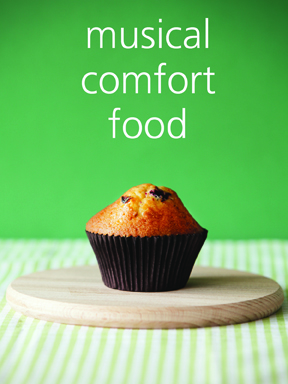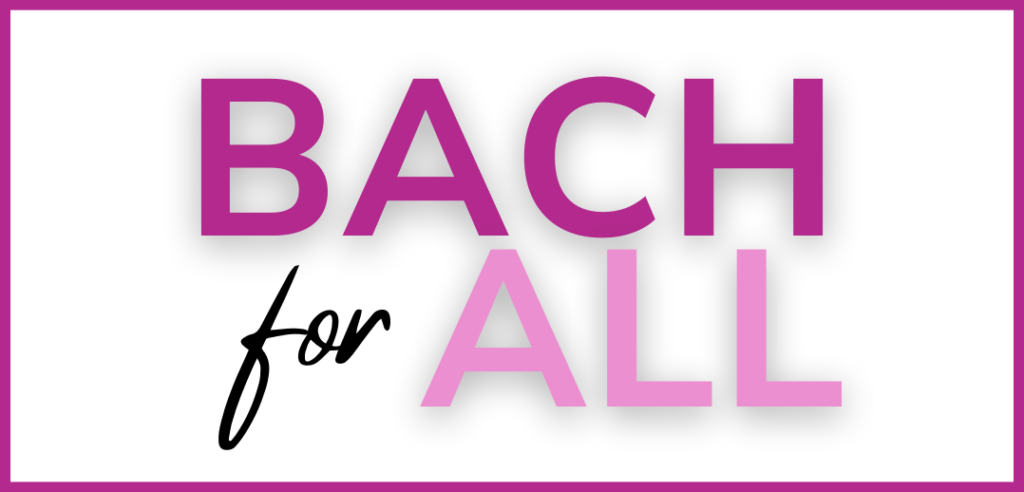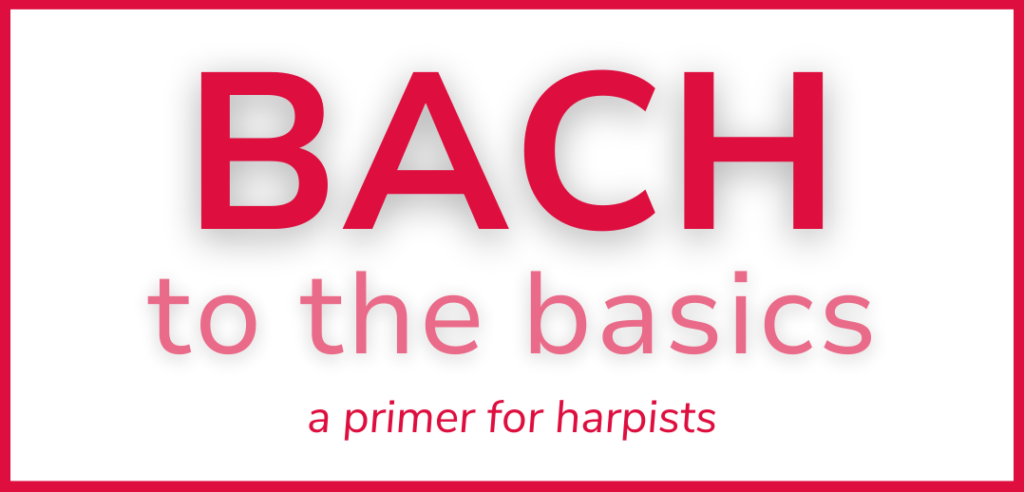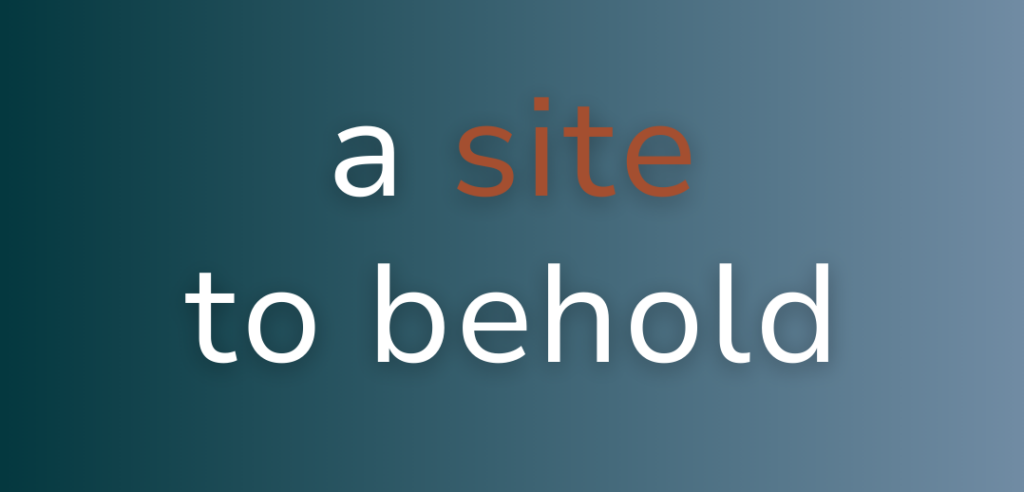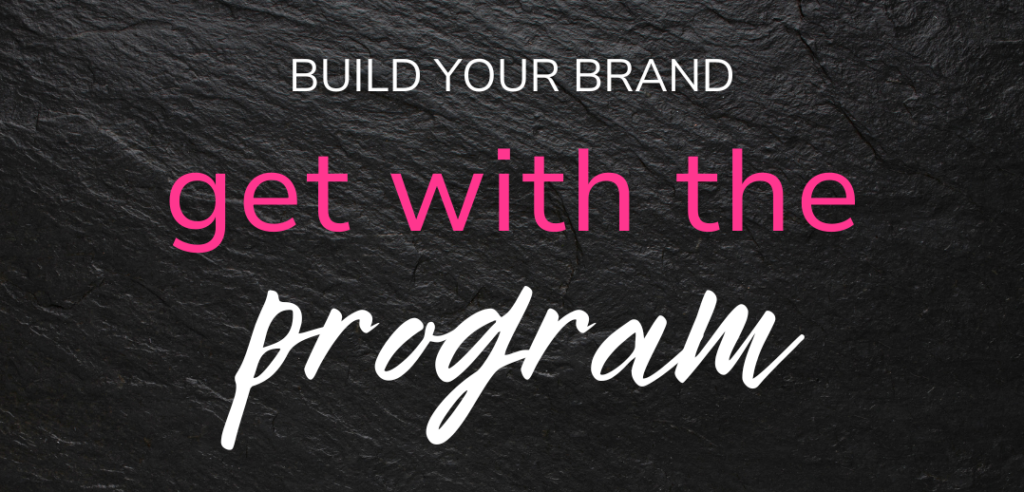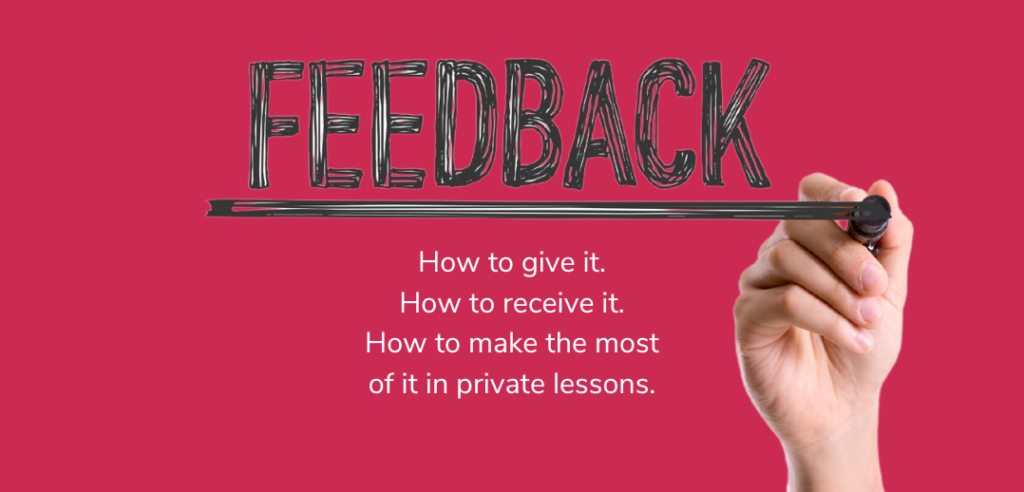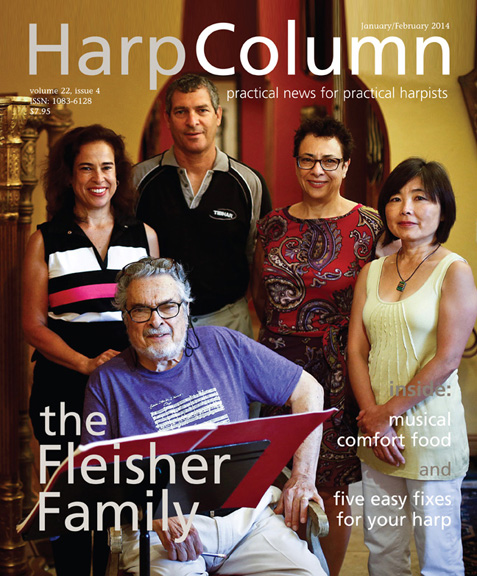What music do you crave when you need something warm and nourishing?
The cold, blustery days of winter are upon us. While the snow is falling and the wind is howling outside, inside you throw on a warm sweater and sit down at the harp. You know you should work on some Bochsa etudes or maybe learn that orchestra part you have to play next week. But days like these leave you craving something warm and nourishing—comfort food at the harp. So what do you pull out and sink your teeth into when you want to play some satisfying comfort music?
We put this question to harpists across the country and received some interesting answers. Some harpists say that harp music isn’t really their comfort food—playing represents other things to them, namely work or service to others. But many hold deep emotional ties to certain pieces, genres, or composers, and connecting to that music is as satisfying as a piping hot bowl of chicken noodle soup.
It was my habit to practice every night after supper when growing up as a child from age 6 to 18. I still have a natural yearning to go sit at the harp after my dinner every night and play. Sometimes it is in preparation for an event, and other times it is just to restore my soul. I may choose a little snippet of actual compositions, but more likely I will improvise on a familiar tune or original thoughts. I will play random notes with lots of glisses and harmonics, searching for varieties of sound. Sometimes a waltz will come into my head, which may develop into a little duet arrangement (“Ballet of the Butterflies” for example). I may play a hymn like “Amazing Grace” or “What a Friend we Have in Jesus” if I am depressed or homesick for family members long gone. Sometimes I choose Stephen Foster’s “I Dream of Jeanie” or “Beautiful Dreamer.” If I feel peppy I might do some Christmas pop like “It’s Beginning to Look a Lot Like Christmas,” all without music. I love to improvise and printed music would get in the way of my meditation and ruin any spontaneity.
[protection_text]
This meandering is very soul satisfying. If I have to be away from a harp for any length of time, I miss it greatly. After a little playing session I feel refreshed and satisfied, content until the next time. I have finally come to realize that it is not the number of fast passages or intricate figures that make music interesting, but the emotional response that the music brings in its simplicity. There is nothing that can match the physical reaction of playing a haunting or a lilting tune. —Louise Trotter, Houston, Texas
Since the vast majority of my time at the harp is spent preparing music for concerts or special requests from others, the simple act of playing a harp solo gives me comfort. It reminds me of my early days as a fledgling harpist—the excitement of discovery of great music, the challenge of mastering this complicated instrument. Choosing music for myself is like constructing a beautiful bouquet. Depending upon my mood, it could include the order and structure of Baroque music as foundation, lush harmonies of the Romantic era for filling, the clarity and simplicity of evergreen Celtic music, or the drama of a Piazzola tango for a splash of color. —Ann Lobotzke, Milwaukee, Wisc.

“When my soul needs nourishment I listen to grand works like a Rachmaninoff piano concerto, the Barber Adagio for Strings, the “Adagio” from Mahler’s Fifth Symphony, or Puccini arias.” —Stephanie Curcio
Since the age of 5, I have worked in music almost full time, first as a student (piano, harp, theory, composition, etc.) then as a performer, teacher, arranger, composer, publisher, presenter, and writer. Consequently, I do not turn to playing as a source of relaxation, comfort, or pleasure. Playing is my work and my career, which I love and always have. But when my soul needs nourishment I listen to grand works like a Rachmaninoff piano concerto, the Barber Adagio for Strings, the “Adagio” from Mahler’s Fifth Symphony, or Puccini arias. These pieces can reduce me to tears—they are my “comfort food.” They seem to penetrate my very being. Why? I have no idea! The genre is clearly romantic, melodic, expressive, and harmonically complex. They are also orchestral, which connects to that part of my career that I have always loved best—playing in an orchestra. But my love of this type of music preceded my development as an orchestral harpist. I believe that our connections to music are most often emotional, seldom rational. Perhaps hypnosis and a psychiatrist’s couch could find a connection, but short of that, it is what it is and I would have it no other way. —Stephanie Curcio, Londonderry, N.H.

“I have a tattered copy of “The Dawning of the Day” by Laurie Rasmussen that has been a companion over the years.” —Barbara Chapman
I, like most performing harpists, spend a great deal of time offering musical gifts to others. While much of my work is profoundly soul-satisfying, there is always the element of “performance” associated with it that defines the experience.
I have a tattered copy of “The Dawning of the Day” by Laurie Rasmussen that has been a companion over the years. I can play from beginning to end with total ease, and I always feel calmed and refreshed by the gentle melodies. There are enough minor harmonies to be nostalgic and thoughtful and enough major harmonies to be uplifting. These arrangements are simplistic and spacious, yet have plenty of ornaments and interesting rhythms to keep me engaged. I have always loved folk tunes and a half hour with this collection feels like a restorative yoga class. —Barbara Chapman, Norfolk, Va.

“I often turn to Salzedo’s “Five Poetical Studies for Harp Alone” from his Modern Study of the Harp.” —John Carrington
For those times when I just want a musically satisying exerience to nurture my soul, I often turn to Salzedo’s “Five Poetical Studies for Harp Alone” from his Modern Study of the Harp. These are early pieces that are accessible to the listener, and I find them extremely expressive and a great way to build technique. Besides my affinity for Salzedo’s mastery of harp writing, these pieces bring back many warm and nostalgic memories for me. I first encountered them listening to Lucile Lawrence’s LP “A Harp Recital” which I nearly wore out from repeated listenings as a teenager. What a thrill to meet her some years later at Tanglewood. I remember learning “Flight” ever so slowly during my formative years of summer study in Camden, Maine, with Alice Chalifoux. I eventually performed these pieces in recital at Cleveland Institute which was such a special time in my life of intensive harp and musical study. I treasure playing through the same copy of music and finding her pencil markings on the page and can still feel her pressing the beats of the rubatos from “Idyllic Poem” gently into my shoulder with her hand. We are all time travelers of a sort when we perform or “recreate” a piece of music written in the past. It is being transported to that moment in 1918 when Salzedo set the notes to ink but also personally allows me a stop in Camden in 1987 and a Cleveland recital in 1990. —John Carrington, Seattle, Wash.
I embrace my concert grand and play Debussy’s “First Arabesque.” I love the way my fingers feel on the strings—they are doing a graceful dance between the steady eighth notes in the left hand and the delicate descending triplet pattern in the right. The harmonies are warm and comforting—almost like a massage for my hands. I can play the piece at any tempo that my mood inspires and stretch and push the tempo like a dancer.
When I touch the strings on my Celtic harp, I love to relax my brain and let the fingers play whatever feels good. I find comfort in playing arpeggio patterns of 4-2-1 in the left hand and adding intervals of a ninth and eleventh in the right hand, allowing the harmonies to vibrate before resolving them. Sometimes the music is fast; other times it is slow and I play along with my breathing. I enjoy centering on different modes and find myself improvising for 20 minutes or so. I can feel the vibrations close to my heart when I play this harp, and I find it calms me before calling it a night. —Janet Witman, Kennett Square, Pa.
When thinking about “comfort food” and associated pieces of music, I have to say that Zabel’s “Marguerite au Rouet” (Marguerite at the Spinning Wheel) is just that piece for me. The work, written in minor, evokes so many feelings—introspection, contemplation, pensiveness, sorrow—much like a meal or a certain fine wine can conjure memories, good or sad. A hearty beef stew or pot roast focuses me, grounds me, and envelops me in warm comfort. Playing the Zabel work creates those very same feelings in me as I perform the romantic chord progressions that bring color and life to a hauntingly beautiful work.
—Don Hilsberg, Elizabeth, Col.

“Just like you crave pizza one night and a salad the next, the music is satisfying a current need of the body or mind. ” —Kerstin Allvin
I pull out whatever I am feeling at the moment. I crave Bach, Tournier, jazz and pop standards, or just free improvisation.
I think that the music is always nourishing to some aspect of the self. Since it is part of you, your musical soul if you will, then it contains all that is you. Your past experience, the past emotions it invokes, how “good” it feels in the hands and body—these are physical, emotional, soulful, spiritual, aspects of yourself. You may not even recognize them as such since they just happen and have evolved from deep memory and life experiences. Because of this, playing what you want and how you feel in the moment can shift. Just like you crave pizza one night and a salad the next, the music is satisfying a current need of the body or mind.
It may be that I need to play something that organizes a chaotic period of my life, something solid and grounding, so I pull out Bach or Mozart; or I need to just feel heard, so I improvise, arrange, or freely compose; and sometimes I just need to let the instrument do what it does best—vibrate and sing, fully, deeply, and richly—so Tournier and Ravel really do that for me. —Kerstin Allvin, Detroit, Mich.

“I must admit, I have never really learned the Handel Harp Concerto, but I love the music of Handel.” —Rhett Barnwell
To be perfectly honest, it is a rare luxury for me now to sit down at the harp and simply play for my own enjoyment. There are several pieces that come to mind when I don’t feel like practicing or warming up but just want to play for myself.
I first heard Marcel Grandjany’s Aria in Classic Style years ago at a concert in a convent. I thought it was one of the most beautiful pieces I had ever heard, and the fact that it was played in such a peaceful, beautiful setting, out in the middle of nowhere, served to transport me to a different time and place. Whenever I need to just play for me, I will play this piece.
I must admit, I have never really learned the Handel Harp Concerto, but I love the music of Handel and have since my teens. For some inexplicable reason, I feel an emotional connection to his music, and I think this concerto in particular is just a great piece of music. Even just playing the snippets that I know brings me a great amount of joy.
Gregorian chant improvisation. Okay, now I am officially eccentric with this one, but my love of early music extends back to this unique and transcendent repertoire. I think that Gregorian chant was, and still is, a powerful medium for meditation, worship, and healing. So, for my own personal spiritual growth, I find that playing chant on the harp, and improvising simple arrangements, is very gratifying. —Rhett Barnwell, Atlanta, Ga.
When playing purely for self-fulfillment, I tend to go for a combination of both old and new music. Playing music you’re familiar with is a lot like going home for the holidays and eating your mother’s cooking. Its familiarity provides comfort, no matter the objective quality. Likewise, new, unfamiliar music is stimulating—it’s entertaining by virtue of the fact that you don’t know what comes next. The element of surprise keeps you engaged.
Most of the music I take out when playing for myself is familiar music—pieces that I studied years ago but have consistently pulled out every few months or so. These are like old friends. But sometimes I’m in the mood for something new. I perpetually have a stack of music that I intend to play someday, and this is a great way to appeal to my musical desires, as playing music that you engage with as a listener but are unfamiliar with as a performer can be very exciting.
I view music as a primarily emotional experience. Often, it seems to me, music is able to convey emotions too complex for words. Like eating a fine wine or cheese, the experience is distinct, hard to describe, but supremely satisfying. For this reason, I believe that the best composers are those who are best able to access these complex emotions, and so I find that certain composers consistently write music that strikes emotional chords that resonate with me. For me, fulfillment of some primal need for this emotional experience seems to be the phenomenon that provides comfort when listening to music. —Sam Karlinski, New York, New York

“The closest I come to playing for pleasure is sight-reading through new music.” —Lorelei Kaiser Barton
I have to say that I don’t do much “comfort food” playing. I enjoy the rigors of practicing challenging music, getting ready for a performance. With teaching, this keeps me busy enough. The closest I come to playing for pleasure is sight-reading through new music or new editions of music. It keeps me up on what I like to present to students and the harp festival store. Other than that, I don’t have time for anything else. I keep thinking that when I am retired I may like playing for my own pleasure. —Lorelei Kaiser Barton, Tulsa, Okla.
There are two pieces that I keep on my music stand year-round. My ultimate favorite is Benjamin Britten’s “Interlude” from A Ceremony of Carols. Written in seven flats, the resonance of the harp just shines. It begins delicately, in a meditative mood, using harmonics to create a chant-like setting. Rich harmonies and sophisticated rhythm build towards a glorious climax using the entire range of the harp. The sound is very modern, universal, and satisfying to play.
The more intellectually challenging favorite is Bach’s “Fugue” from Unaccompanied Violin Sonata No. 1, arranged by Grandjany as Etude No. 2 in the Bach-Grandjany Etudes for Harp collection. I am grateful for Grandjany’s foresight to transcribe this solo violin masterpiece for the harp. Bach’s counterpoint and harmonic language never ceases to amaze and inspire. —Lillian Lau, Chicago, Ill.
I love older jazz tunes and ballads—Cole Porter, Gershwin, “Fats” Waller, the Beatles. The beautiful extended chords get me every time, as do the syncopations and wide triplets and swing rhythms. These musical sounds put me in another world. I am also intrigued by the structure and contours of great melodies, from jazz to the Beatles to Schubert.
Growing up, our house was filled with recordings of this kind of music, as well as opera. My parents loved the two genres, but I really was moved by the jazz and ballads. I have a collection of tunes, arranged by others, and a few that are piano arrangements that I have tweaked. I am sad that I cannot just sit down and play by ear, but certainly grateful for the arrangements I can purchase. This music creates a feeling of warmth and inspiration when I hear it and play it. —Joan Holland, Interlochen, Mich.
I crave a beautiful melody. I love to sit with my Celtic harp and feel the vibrations. I feel very connected to my lever harp. I like the way it feels to play it. I adore the pedal harp but that feels like more work at times. I love the way a lot of the Celtic music just fits in my hands and I can just make music and not stress about the pedals. It also feels more comforting than the big pedal harp at times because of its size. Although I play a lot of pedal harp and a lot of classical music I notice I gravitate towards my lever harp when I want to play for relaxation. The music I pick for these times tends to be Celtic or music that is familiar to me, such as “Shenandoah,” which I clearly remember singing in grade school and playing arrangements of in orchestras when I was a flutist. For my own enjoyment, I often play classical transcriptions of pieces I have known forever, and sometimes play hymns. An interesting example of something I love is Kim Robertson’s arrangement of “Jupiter” from Holst’s Planets. I have played the harp orchestral part and it is beautiful, but the solo part also speaks to me in a special way, and I have yet to tire of playing this piece. I especially like Sunita Staneslow’s and Kim Robertson’s arrangements. They feel like home, like I was meant to play them.
I have wondered why I keep gravitating back towards Celtic music when classical is what I listen to most. I have Scottish/Irish background and have wondered if that is part of it. —Lisa Fenwick, Ithaca, N.Y.
•






